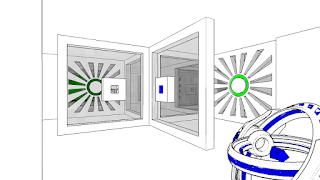Developer: Alexander Bruce
The other night, my wife and I were stuck watching some hacky sitcoms in a waiting room. The jokes were stale, the plots predictable, and we didn't laugh once. Once they were over, we were furious. Why? Because I could have written a better TV show than the shows we watched, and I don't even write for TV.
Another show that we're fans of is How I Met Your Mother. On a good episode of HIMYM, the plots flow together so ably and easily that you can't help but be impressed with the talent and skill of the writers and showrunners. When you're finished with a really good episode, you just sit back in awe, thinking, "How did they come up with that idea?"
What does any of this have to do with Antichamber?
Well, there are some games that you play that make you say, "I could have done this myself." Once you're done playing Gun Shooterface 8: Shoot Harder, you roll your eyes, set the game aside, and move on. There are many games like it, and another one will roll down the pike as soon as you turn around.
On the other hand, Antichamber is one of those games that I could never have made in a million years. I remain in awe of it. I don't even know how someone would even start making a game like Antichamber. It's forces your brain into such odd configurations that I shudder to think of the condition of the brain that Antichamber came from.
If I were to sum up Antichamber in a few words, it would be "Portal plus Metroid plus M. C. Escher." The first and most obvious comparison is Portal and at first glance, there are some similarities between the two games. You're in a strange place, Antichamber is in first-person, there are puzzles, and you get a gun with which to solve the puzzles. That's where the similarities end, though. Unlike Portal, there are no discrete "test rooms," there is no narrative, and Antichamber has puzzles far more extreme than Portal had in its wildest moments.
Here's an example of a fairly early puzzle in Antichamber: You are standing in front of two corridors. The one on the left is tinted red and the one on the right is tinted blue. You walk through the red corridor and end up back looking at the same corridors. You walk through the blue corridor and end up back at the same place once again. How do you progress?
Another mind-bender: You look through a strangely patterned window and see a different shaped corridor on the other side. When you walk away from the window, you are now in that corridor. Go to the other side of the window and look through again, and you'll see the first corridor. Now stop looking through the window and you're in the new corridor. So, Antichamber plops you in a room with eight windows. Find the exit.
If all of this sounds confusing, that's because it's supposed to be. Antichamber disorients you, forcing you to learn the rules of this strange new place, then forces you to work within them. It doesn't take long until your brain is completely on board with the fact that you have to stare at the giant unblinking eyes on the wall until the eyes close, or that you have to make a pulsating blob of light start rocketing around the chamber you're in to destroy a platform in order that a new platform will automatically be created, and there goes your brain. I think I smell smoke.
You get a gun that gets different abilities along the way. This is where the Metroid comparisons are apt, since every new upgrade to your gun opens up areas that were once closed to you. It requires some backtracking at times in order to proceed onward. If you're not a fan of backtracking in games, this might not work for you. I like backtracking, so it worked out well for me.
There are two minor flaws with Antichamber. One, there are a few instances where you need to know how to use certain skills in order to progress. Antichamber doesn't always adequately explain them, though, so you could end up wandering around for a little too long before the answer strikes you in the face accidentally.
Next, since there's no narrative, the end of the game is a little limp. I'll put the obligatory SPOILER ALERT tag here, but there really isn't much to spoil. In the ending, you just fire a... thing at another... thing, and then some stuff happens, and you can't be certain what you just witnessed or how it has any relevance to what you just went through. Since there's no semblance of anything approaching a narrative, Antichamber doesn't really stick the landing as well as I would like. It keeps you at arm's distance, in a sense. END SPOILER ALERT. For that reason, it's probably not going to ignite the sort of feverish devotion that Portal did, but unless you were a huge fan of falsified pastries, I don't foresee that being a huge issue.
What does it all come down to? Well, I have seen things in Antichamber that I have never seen before in a game, and I'm doubtful that I'll ever see again. Antichamber looks like nothing else, plays like nothing else, and bent my brain like nothing else I've ever played. If you like first-person puzzle games at all, you need to try this.
Final Rating: A-
Sunday, February 10, 2013
Subscribe to:
Post Comments (Atom)













No comments:
Post a Comment